Table of Content
- What is Ancestry?
- How Ancestry Collects Your Personal Information
- How Ancestry Uses Your Personal Information
- Why Is Opting Out of Ancestry Important?
- How to Remove Your Data from Ancestry
- Method 1: The Basic Opt-Out Procedure (Manual)
- Manual Opt-Out Vs. PurePrivacy
- Frequently Asked Questions (FAQs)
Leaving your data on Ancestry and other data brokers can spell huge trouble, as it could fall into the wrong hands.
Over 2.4 million fraud cases were reported in 2022.
Opting out and removing your data is the only way to mitigate yourself from this danger.
This guide is about Ancestry opt-out options and why removing your data is necessary.
Key Takeaways
- Ancestry is a popular website that aims to help people track genealogy and family history.
- Ancestry provides various products and services, including family tree mapping and DNA testing.
- The company may sometimes share data with third-party service providers that process personal information on their behalf.
- There are two ways to delete your data from Ancestry completely. In the first method, you have to remove your data from the website manually; in the second, PurePrivacy is used to opt out automatically.
- PurePrivacy will help retrieve your data from Ancestry and dozens of other data brokers.
What is Ancestry?
Ancestry is an online platform devoted to helping people trace their circle of relatives' information and genealogy. As a part of its own family tree research services, the platform gives access to an intensive array of information, overlaying areas such as marriages, schools, the military, and many others.
All that goes on behind the scenes involves data. Your data is the driving force of this platform, and there is no guarantee it cannot fall into the wrong hands.
Opting out is the best solution to protect yourself from the dangers of having your data in the wrong hands.
How Ancestry Collects Your Personal Information
Ancestry employs numerous strategies to accumulate client data, using it for several things that could have both beneficial or potentially disadvantageous implications for its customers.
The personal data collected at some stage in the search approach might also vary primarily based on location. In some jurisdictions, Ancestry is obligated to collect and preserve extensive information to comply with relevant guidelines.
These afford the company's dedication to adhering to nearby criminal hints and regulatory necessities inside the areas in which it operates. In a few jurisdictions, there may not be authorization to accumulate positive kinds of data.
Some of the core channels through which they collect people’s data include:
- Social media platforms
- Public records
- Voter records
- Government websites
- Other data brokers
It is no secret that data brokers use some unethical means to accumulate data without the clear permission of users. I’m pretty sure you will not willingly hand your data over to them, especially when you know what the outcome could be.
How Ancestry Uses Your Personal Information
Indeed, as part of its operations, Ancestry may give private records to its partners for processing without requiring your precise consent. This is not unusual for numerous operational goals, including data processing and customer service.
Ancestry may additionally share your records if it is deemed necessary to comply with legal approaches or to guard the rights, property, or safety of Ancestry. In the occasion of an acquisition, Ancestry may release your data to the receiving or acquiring entity.
Why Is Opting Out of Ancestry Important?
Taking yourself far away from this domain named Ancestry is something that I would call “totally necessary.” Some of the benefits of doing so include:
- Opting out will reduce the number of targeted ads you experience when surfing the web.
- Scammers and identity thieves will have limited access to your data, so they can’t use it for their illicit activities.
- It will reduce the misuse, abuse, and sale of your personal information.
How to Remove Your Data from Ancestry
Two methods are recommended for opting out. The first is manually opting out by following the systematic commands I'll provide below. The second approach is to use PurePrivacy, an all-in-one tool for improving your virtual privacy.
Method 1: The Basic Opt-Out Procedure (Manual)
You can erase your non-public records from this platform using the underlined steps. Just don't forget that to opt out, you ought to have an Ancestry account.
Step 1: Visit the opt-out page
- I got to the account deletion page.
- Enter your account credentials to log in.
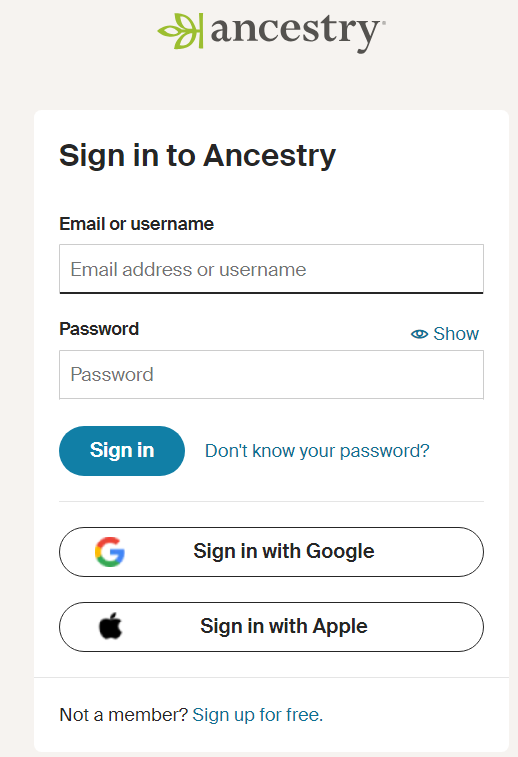
Step 2: Try and confirm that your details
- After you log in, check your details for you to be sure that it is your true account.

Step 3: Choose the reason for deleting your account.
- Down below the site, there may be a form where you may imply the cause for deleting your account.
- Choose “I Have Privacy Concerns.”
- Click “Continue.”
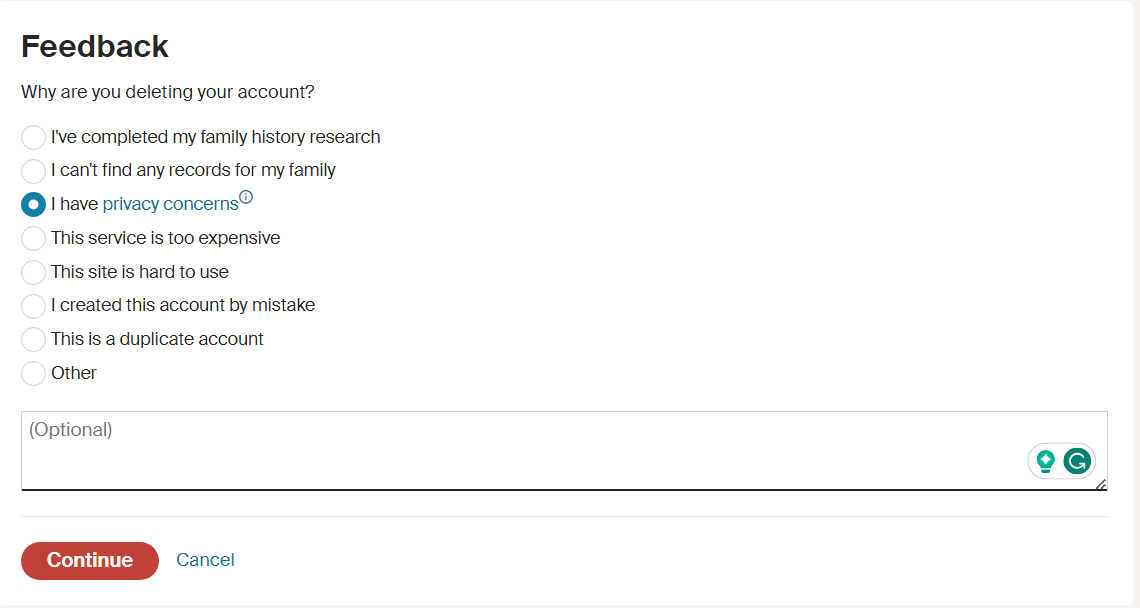
Step 4: Confirm your password
- You will be prompted to enter your password.
- Enter your password and click “Next Step.”
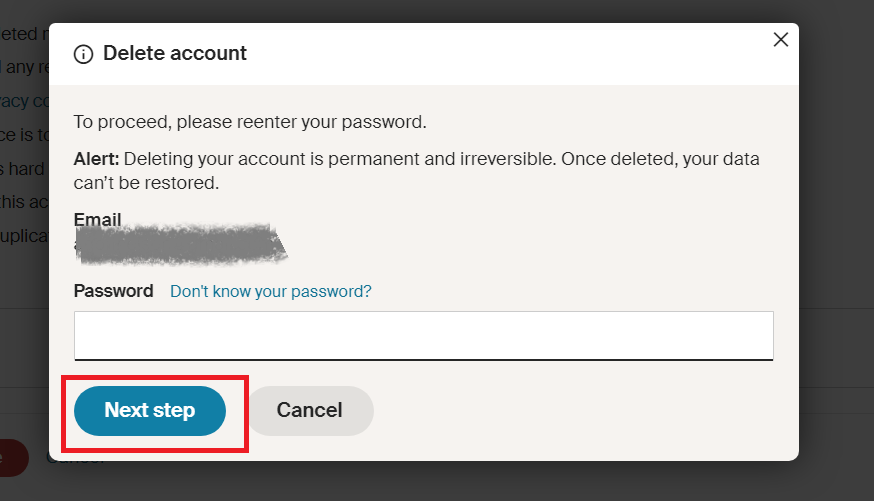
Step 5: Confirm account deletion.
- They will now give you a verification code in your email address.
- Just put that verification code into the space and click “Delete Account.”
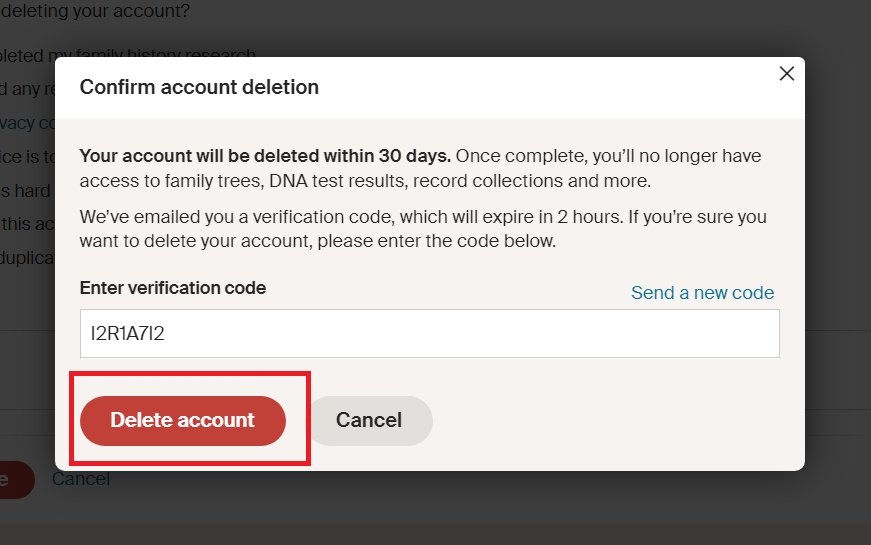
Step 6: Email Confirmation
- You will receive a confirmation email about the deletion of your account.
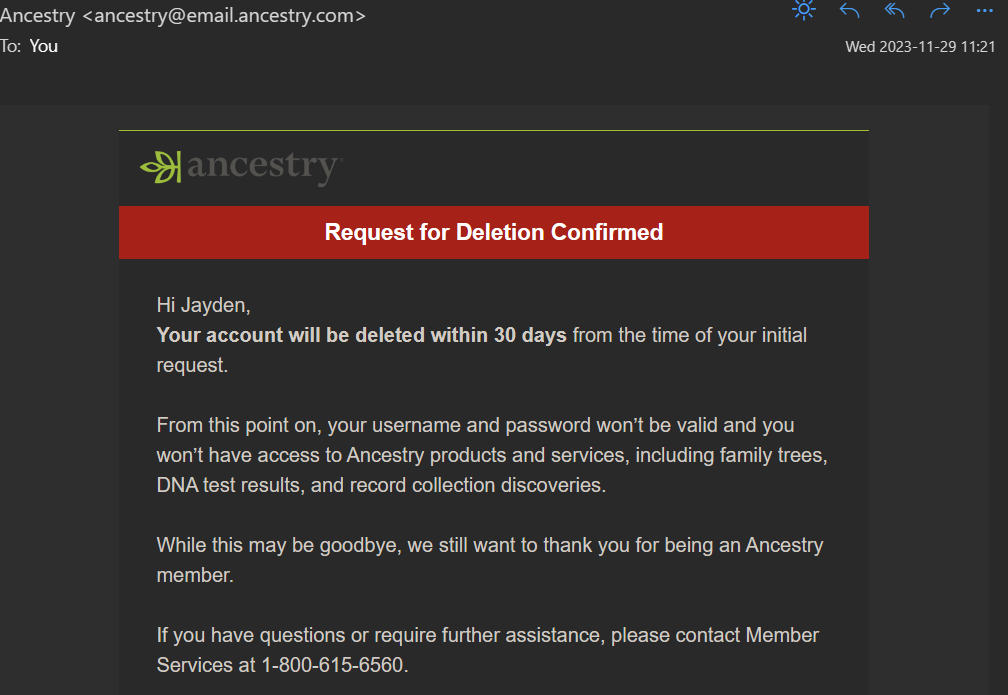
It would take like 30 days for them to remove your data from that system.
Manual Opt-Out Vs. PurePrivacy
- You are required to provide additional personal information to opt out
- It might take weeks or months for your data to be removed
- Complete removal of your data is not guaranteed
- The opt-out process can be detailed and time-consuming
- Works automatically to remove your data and secure your privacy
- Will automatically remove your data from all data brokers
- Only your consent is needed. Your input is not required
- Opts you out with just a few clicks and in less than a minute
Frequently Asked Questions (FAQs)
-
Is Ancestry safe?

Ancestry is not entirely safe, and your data could be a risk of being used for malicious or unethical activities. Hackers and cybercriminals can also access your data, which is something you don’t want.
-
What kind of information does Ancestry collect about me?

Ancestry can acquire a variety of information, consisting of your e-mail address, cell phone numbers (landline and cell), address history, date of birth, employment records, education history, criminal history, household, marriage & divorce statistics, social network data, judgments, dispute settlements, liens, and bankruptcies.
-
Why should I be concerned about Ancestry's data collection?

There have been court cases on the grounds that Ancestry gathers publicly available data, and internet fraudsters and many forms of attackers can misuse these records.
-
How can I remove my data from Ancestry?

There are two methods:
Manual Opt-Out: Visit Ancestry's website, look for your name, select your report, and comply with the opt-out process, which includes filling out a form.
Use PurePrivacy: A more streamlined technique that automates the opt-out procedure. It can opt you out of Ancestry and multiple different data brokers concurrently.
-
How long does it take to opt out of Ancestry?

After filling out and submitting the form, you have to wait for a few days or weeks for Ancestry to remove your data from its system completely.
Your Privacy Matters
Your data privacy should be one of your top priorities.
Trust me, you don’t want to experience the dangers that come with leaving your data exposed and accessible to scammers and cybercriminals.
Opting out is the surest way to protect yourself. PurePrivacy helps streamline the process and makes it much easier and faster. You can also use it to opt out of multiple data brokers simultaneously.





